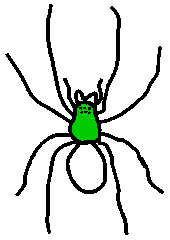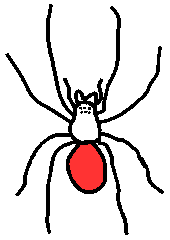
The most visible parts of the body of a spider are: the cephalothorax, the abdomen, and the legs.
If you look it bit closer you will also see the chelicera, the palps, and the eyes
To learn more about the anatomy, click on the different body parts of this spider !!

Click on the spider!
Cephalothorax

The body of spiders is divided in two major parts. The first (anterior) part of the body is called the cephalothorax.
Spiders are different from insects. The body of insects is divided in three major parts: head, thorax and abdomen. If we compare a spider with an insect, the cephalothorax is a combination of head and thorax.
The cephalothorax of spiders bears in front a pair of
chelicera and a pair of palps. It also bears 4 pairs of legs (total 8 legs), and on top a number of small eyes.
Spiders have no antennae and no wings.
Abdomen

The abdomen is the posterior of the two body regions of a spider. On the tip of the abdomen we find the spinnerets. These are very small organs that produce silk for making webs. Often, spiders have 6 of these small spinnerets.
Legs

Spiders have 8 legs. This sets them apart from insects, which have only 6 legs. The legs are usually long and hairy. The hairs on their legs are used to pick up scents, sounds, vibrations and to detect air currents. Most spiders can move very fast, and some can also jump.
Chelicera

At the front of the cephalothorax we find a pair of chelicera. These fan-like or claw-like appendages are mouthparts. In spiders these chelicera are hollow and contain venom glands (or they are connected to these glands). The spider uses them to inject poison into its prey.
Palps

Spiders have a pair of palps (or pedipalps) on the front of the cephalothorax. In male spiders, the ends of these palps are modified into complicated structures that are used for mating.
Eyes

Also read: How and what spiders eat.
See also: Insect body parts
Many school children and teachers visit this page to learn about spiders. If your school has a website, please link to this page.
